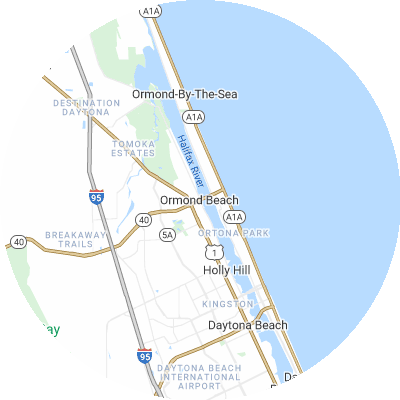Please enter a valid 5-digit zip code!
Written By David Cusick
Last Updated April 2024
Rooftop solar is one of the most easily accessible forms of renewable energy for Ormond Beach residents. Making the transition to solar energy can help you save money and reduce your carbon footprint, but you want to make sure you find a reputable installer. Luckily, we've reviewed the options and assembled a guide to the best and most trustworthy solar installation companies in Ormond Beach.
Informative resources
Reliable customer support
Free quotes
Clear pricing policy
Services Offered
Reliable customer support
Free quotes
Clear pricing policy
Informative resources
Services Offered
Free quotes
Informative resources
Reliable customer support
Clear pricing policy
Services Offered
Clear pricing policy
Family-operated business
Free quotes
Informative resources
Reliable customer support
Services Offered
Free quotes
Informative resources
Services Offered
Clear pricing policy
Free quotes
Reliable customer support
Services Offered
Free quotes
Informative resources
Reliable customer support
Clear pricing policy
Services Offered
Reliable customer support
Informative resources
Free quotes
Clear pricing policy
Services Offered
Clear pricing policy
Reliable customer support
Informative resources
Free quotes
Services Offered
Clear pricing policy
Reliable customer support
Free quotes
Informative resources
Services Offered
Today's Homeowner looks at dozens of datapoints on solar companies to come up with our data-driven rankings. It's not possible for a company to pay for preferential treatment in our rankings. We look at the following key factors in determining who should top our list:
Putting solar panels on your roof could lower your electricity payments while helping the environment by reducing your carbon footprint through renewable energy use. Key considerations when researching local solar installers are as follows.
Hiring a licensed solar installer is critical. This helps ensure that the work is done properly using the most up-to-date installation methods. Once an electrical professional in Florida has four years of field experience, including one year as an apprentice, they can pass two tests to earn a CV license with the Florida Construction Industry Licensing Board. The Sunshine State also allows electrical contractors to install solar panels, but they may need to subcontract some tasks to a licensed roofer.
Look at review platforms such as Google Reviews, the Better Business Bureau (BBB), and TrustPilot to find out what previous customers have to say about local solar installers. Reviews can give you an idea of a company’s trustworthiness and customer service. Avoid companies lacking reviews or with predominantly negative feedback.
Get free, detailed quotes from three to five solar companies. The quotes should outline all costs and identify the solar parts included. Comparing several quotes can help you find the best value for your budget.
Quality solar installations should have comprehensive workmanship and performance warranties. The workmanship warranty covers any installation problems such as poor alignment, poor wiring, or cracks in the panels. The performance warranty ensures a specific energy output level. Strong guarantees indicate that a solar installer has faith in its installations.
Solar energy can help decrease your electricity costs in the long run. When weighing solar panel's cost and value, be sure to consider these considerations.
The average Ormond Beach homeowner will spend around $12,298 on a home solar system after federal tax refunds. Solar arrays in Ormond Beach cost approximately $3,210 per kilowatt, with an average size of 5.5 kilowatts. A personalized estimate from a local solar provider will include costs for preliminary work, labor, and permit fees, and will account for your system's capacity, size, and panel type. Some homeowners prefer to lease their solar panels to reduce upfront costs.
Incentive Type: Sales Tax Incentive
Incentive Amount:
All
Incentive Type: Property Tax Incentive
Incentive Amount:
Residential: 100% of the added value
Non-Residential: 80% of the added value
Generally speaking, a solar photovoltaic (PV) system can be used to power any household system or appliance that uses electricity. In the simplest case, you can use a solar water heater.
There are a number of advantages of home solar energy. You can reduce emissions, qualify for tax benefits, and raise your property values. With the right storage equipment, solar panels can also give you additional energy security and offer some protection from power outages.
It depends on your location and what type of panels you're installing. With the winter months in Florida being very mild, you have a lengthy window to install your panels, though they won't achieve peak performance until summer arrives.
Yes, it's possible to use home solar energy alongside conventional power sources. In many areas, solar panels are designed to supplement your existing energy sources, so you can reap the savings and environmental benefits of solar energy without having to completely switch over.
Generally speaking, your energy bills will significantly decrease after you install solar panels. This is because you're using the energy you generate for free rather than buying it from your power company. In Ormond Beach, the average amount someone can save is $1,166 per year. With net metering programs offered by many utilities, you could ultimately make a profit from your system after the payback period concludes.
The specific required maintenance steps will vary based on the type of solar panels you have. With any system, you should clean and inspect each panel once a quarter. Your solar contractor might offer comprehensive plans where they'll do the maintenance for you.
Net metering is a type of "power purchase agreement." If your utility or state offers net metering, you can sell the solar energy you don't use to your provider. In return, they'll give you a credit on your power bill.
When it comes to taxes, the federal government offers a tax credit of up to 30% of the panels' cost. Depending on where you live, you could also claim or apply for state or property tax incentives. For insurance, your monthly premium may be slightly higher because solar panels increase your property's value. You should speak with your accountant or insurance agent for information specific to your case.
